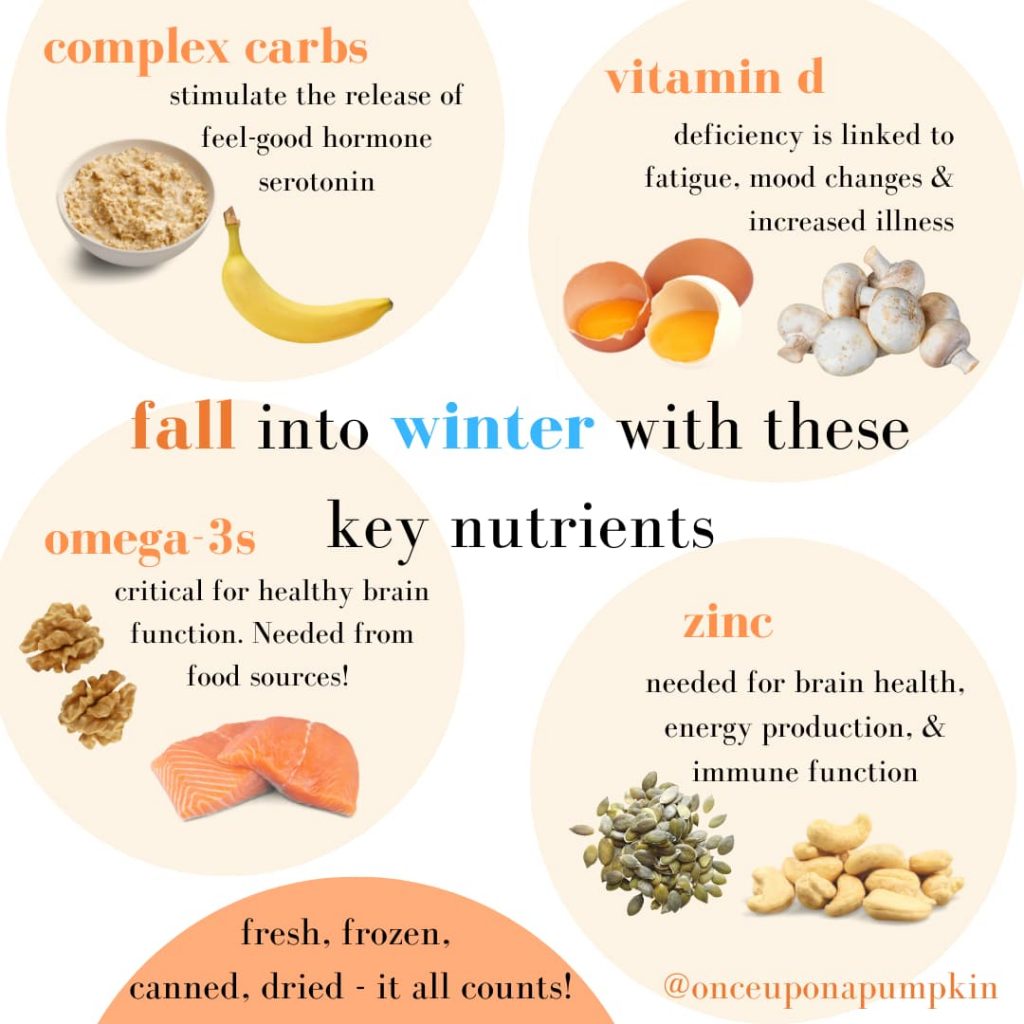Fall into winter with these key nutrients to include in your diet in the winter. As the days get shorter, there is less sunlight and the temperature dips we can start to feel moody, fatigued and unhappy to name a few. Learn which nutrients play an important role in helping us feel our best and stay healthy especially during the winter months!

We’ve all felt it. Shorter days, less sunlight, cold weather, and more time spent indoors compile to just leave you feeling “blah”. I know the feeling. Known as the “winter blues” or Seasonal Affective Disorder (SAD) impacts more than10 million Americans. Another 10 to 20 percent may have mild SAD. SAD is four times more common in women than in men.
The winter blues are extremely common, and many of us experience this mood shift during this time of year. Add that to the fact that it’s also cold and flu season, and it’s a one-two punch that can really knock us down if we don’t take care of ourselves properly through our diet and beyond.
The good news is there are different ways we can combat the winter blues and feel our best during the winter months through what we eat, our daily habits and the things around us. And since I’m a registered dietitian, you know I’m going to tackle the nutrition side of this so that you feel confident on what to include in your diet to feel your best this time of year. Find out what nutrients are especially important in the diet when the weather turns cold and what other things you can do to keep spirits bright!
once the days start getting colder and shorter. Staying active, whether that’s streaming your favorite yoga class or taking a brisk walk around the block, may give you that extra energy boost. Making your environment brighter with a light box or opening your blinds and sitting closer to the window can provide a much needed dose of sunshine. And what about the phrase “good food is good mood”? Have you thought about incorporating certain foods during these winter months? Here are a few things to keep on hand — fresh, frozen, and canned are all great options!
Key Nutrients to Include in Your Diet in the Winter
- Complex carbohydrates. Complex carbs stimulate the release of serotonin, a key hormone that stabilizes our mood and has a calming effect. Mood-boosting carbs like oatmeal, paired with fruit and your favorite nut butter, are a great way to start your day. The combination of carbohydrates and protein will also help keep you full and focused throughout the morning!
Other complex carbs include:
- whole grains
- fruits & vegetables
- beans & nuts
- Vitamin D. Vitamin D, aka the “sunshine vitamin” is sparse during the winter, especially if you live in Chicago like me. Vitamin D is super important for muscle function, immune, and bone health. Many parts of your brain contain vitamin D receptors which play an important role in overall brain health. Vitamin D deficiency is linked to fatigue, low mood, and increased illness. The amount your body is able to make depends on factors such as the season, time of day, where you live, and the melanin content of your skin. For example, if you live in a city with gloomy winters (hello, Midwest!), then you’re more at risk for vitamin D deficiency. Because vitamin D doesn’t naturally occur in many foods, it’s important to monitor your levels (through a blood test at the doctor if you are at risk of being low) and supplement as needed. Fortified milks, egg yolks and mushrooms are some foods that contain vitamin D. Non-dairy/alternative milks (like soy and almond) usually have vitamin D added, just be sure to double check your labels. A note about vitamin D supplementation: it’s important to chat with your doctor and get a blood test to determine if and what dosage of vitamin D supplements are right for you. Since vitamin D is stored in the body you can take too much!
- Omega- 3’s. In addition to their heart-health benefits, omega-3s have been shown to improve mood too. Our bodies don’t make these healthy fats, so we need to obtain them from food sources! Increased levels of two kinds of omega-3s, EPA and DHA, are linked to a well-functioning nervous system. Salmon, sardines, and tuna are all great sources! Frozen and canned options are perfect for stocking your freezer and pantry for the winter months. Check out this list for stocking your pantry and fridge if you need some more inspiration.
Other non-fish sources of omega-3’s include:
- chia & flax seeds
- walnuts
- Zinc. Zinc is a pretty incredible mineral that’s essential for brain health and energy production. Zinc also helps help regulate immune function and works to shorten the duration of the common cold. Animal proteins are a good source of zinc and .y Your body is able to use zinc from animal sources more efficiently than plant proteins. Look to Incorporate pumpkin seeds and nuts, whole grains, and legumes if you are looking for plant- based options.
More Ways to Beat the Winter Blues
- Stay Active. Staying active, whether that’s streaming your favorite yoga class or taking a brisk walk around the block, can definitely give you that extra energy boost in the morning or afternoon.
- Let There Be Light. Making your environment brighter with a light box or opening your blinds and sitting closer to the window in the morning can provide a much needed dose of sunshine. Don’t forget that SPF even in the wintertime when you’re outside!
- Lean on Your Pantry & Freezer. All of the foods mentioned above can be found in canned and frozen varieties as well. Frozen is just as nutritious as fresh and canned items can totally be your best friend when it comes to shortcutting a healthy meal. I’ve got a list of things I think everyone should have in their fridge and pantry here!
- Make Mini Moments of Self-Care. Don’t wait until you’re strung out, exhausted, or mentally burnt out to take a break. Schedule mini moments of self-care into your day, DAILY. Things like quiet time, painting your nails, reading, writing, eating a meal distraction free, or going for a walk outside can all be great “mini moments” that are inexpensive and relaxing.
What else do you do during the winter months to keep your body healthy and stay in a good mood? I’d love to know and add to this list!

